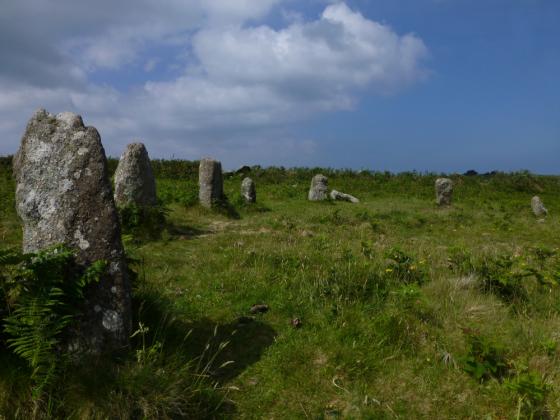
One of the entrances in the courtyard site.

One of the entrances in the courtyard site.


Tall megalithic door- or gatepost within the courtyard settlement.

As far as I can tell this is inside the courtyard.

Remains of structures within the settlement.

General view of the very overgrown site, looking northeast. The prominent hill to the left is Sancreed Beacon, the more distant one to the right is Castle-an-Dinas.

Info board to the west of the site.

I’m ashamed to say I don’t remember what this is! But it must have been part of a structure fo rme to have taken the photo! :D

Part of a reconstructed wall surrounding the village
Visited July 2004
We visited this completely by accident some years back, and for some reason it’s been hovering around in my thoughts so I thought it about time I added it here!
Mrs G and I took a circular walk, starting from Sancreed Holy Well, via Boscawen-Un and associated standing stones, when I spotted the word “Well”, in script, not far up the road, so we thought we may as well investigate.
Following the map, we were taken up the driveway of a private house, with “Goldherring” displayed in the wrought iron gate. We thought it just the name of the property, and thought nothing more of it, as we hadn’t heard of the place until then.
We saw someone sitting in the garden, so we cautiously and politely approached to ask if they knew anything of the well. The man was vrey friendly, and before we could say anything, asked if we’d come to look at the ancient village! Well, yes please, we replied!
He very kindly took us on a guided tour of the site – which, to be honest, was largely unrecogniseable under the foliage, but every now and again, a large stone, or section of wall would appear through a gap. He showed me the location of the well, which was completely overgrown and unidentifiable, and was informed that it had been long since covered after a cow got trapped (and later freed) after falling in!
It was amazing to see the lumps and bumps, and trace the shapes into possible circular buildings
Craig Weatherhill, in his excellent book “Belerion”, suggests the walls are actually later in date (Medieval). We didn’t even think about referring to the book when we visited, due to not even knowing of it’s existence, but would dearly love to go back and have a good explore.












































































































































































